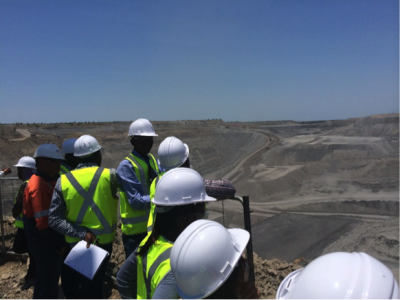Managing Social and Environmental Impacts in mining in Africa
The Managing Social and Environmental Impacts of Mining Africa Fellowship was delivered in 2014 under the Australia Awards in Africa program. UQID partnered with the Centre for Social Responsibility in Mining (CSRM) within the Sustainable Minerals Institute, for technical delivery into the seven-week course.

Our course was based on a four-week foundation module delivered in Australia that covered the world’s best practice in managing social and environmental impacts in mining, followed by a three-week exposure and application module delivered in Madagascar.
Extensive field trips were undertaken in both Australia and Madagascar. In Australia the group travelled to Central Queensland for eight days. While in Central Queensland the group visited Emerald, Gladstone, Blackwater, Mount Morgan, and Woorabinda. UQID/CSRM scoped and coordinated meetings and presentations by local and state government, industry representatives, civil society, and community members. While in Madagascar the group travelled to Fort Dauphin, Toamasina, Tulear and Moramanga, to visit various large-scale mine operations as well as artisanal small-scale mines in Madagascar.
The course aimed to build knowledge, skills and attitudes that will help awardees to engage with, and contribute to, the development of communities in which they work that are impacted by mining and related activities. The course highlighted the importance of communities and the environment to the resources sector, and discussed how social and environmental issues are being addressed by industry at the local, national and international levels. Awardees developed knowledge and skills to identify and analyse social and environmental issues, and to formulate appropriate responses to these issues.
The topics covered for the Managing Social and Environmental Impacts in Mining (SEIM) Africa Fellowship included a balance between theory and application, including:
- global context and international standards
- legislative context
- mine planning to reduce impact
- social responsibility in mining
- social and environmental impact assessments (community participation and disclosure) including:
- gender impact assessment and human rights impact assessment /due diligence
- establishing meaningful stakeholder engagement processes (including separate processes for women)
- environmental and risk managements systems
- environmental protection
- water use, management and impacts
- community engagement
- mining-related sexual violence
- alcohol related violence and HIV/AIDS
- artisanal mining.
Participants in the course each developed a ‘Work Plan on Return’ to implement on their return to the workplace.
Duration: May 2014–April 2015
Funding source: Department of Foreign Affairs and Trade
